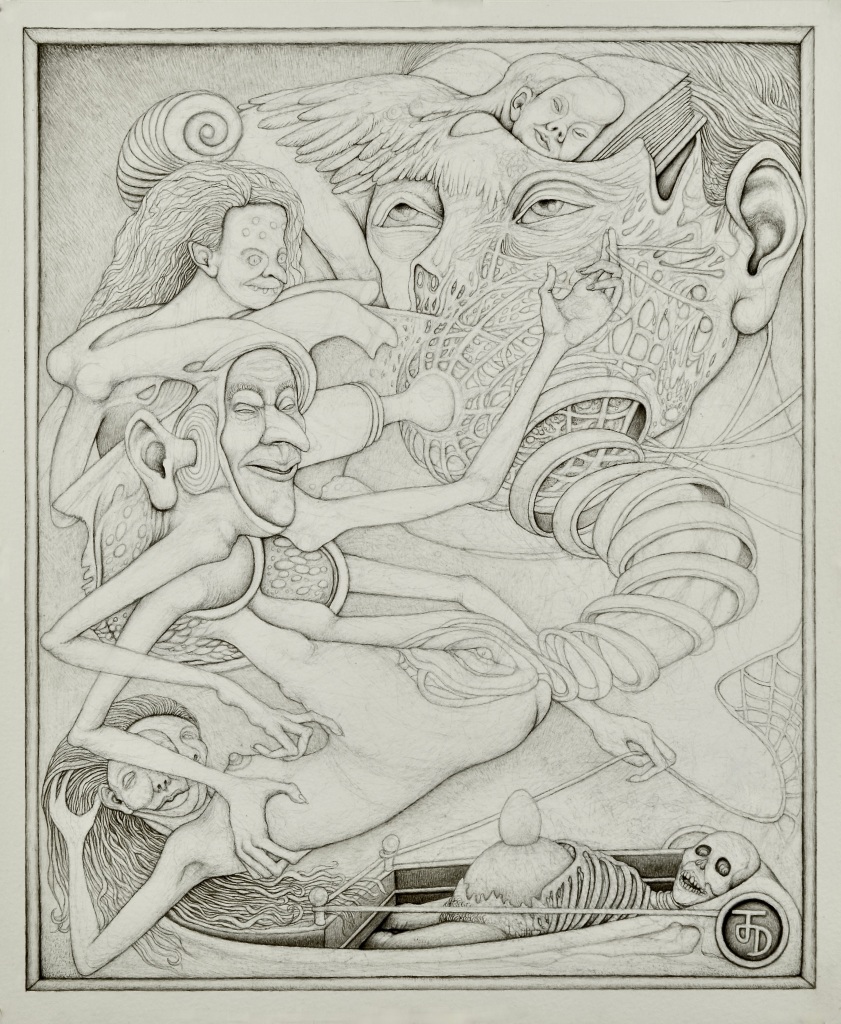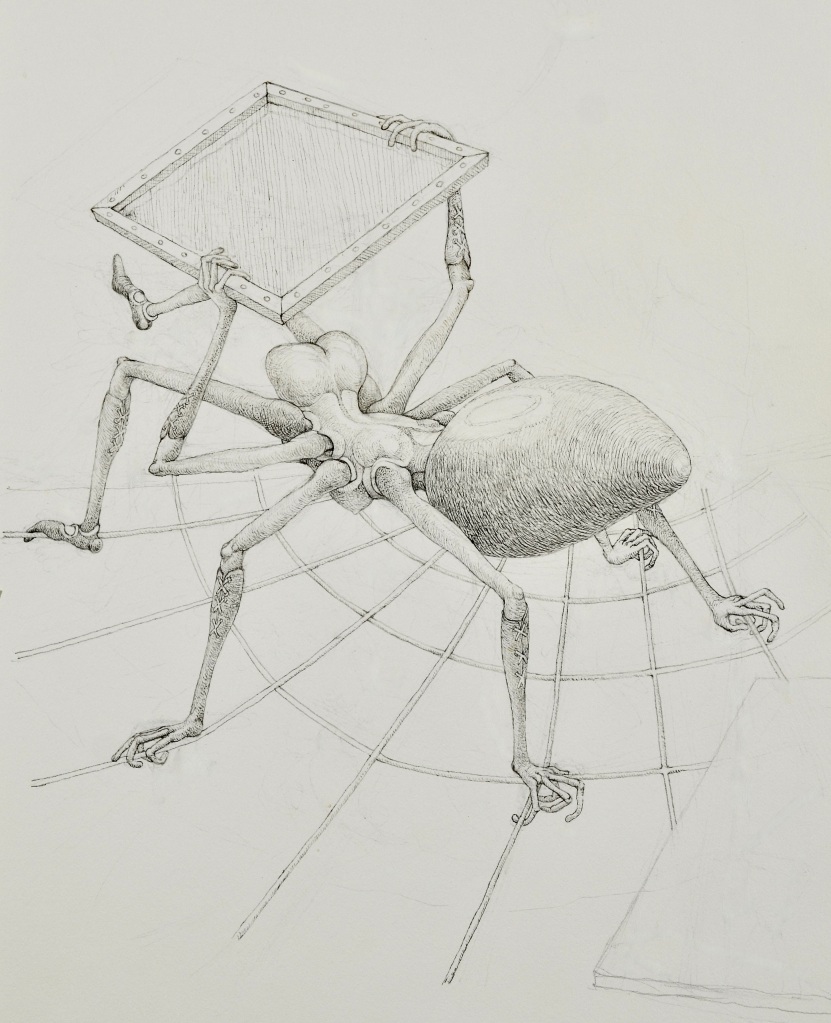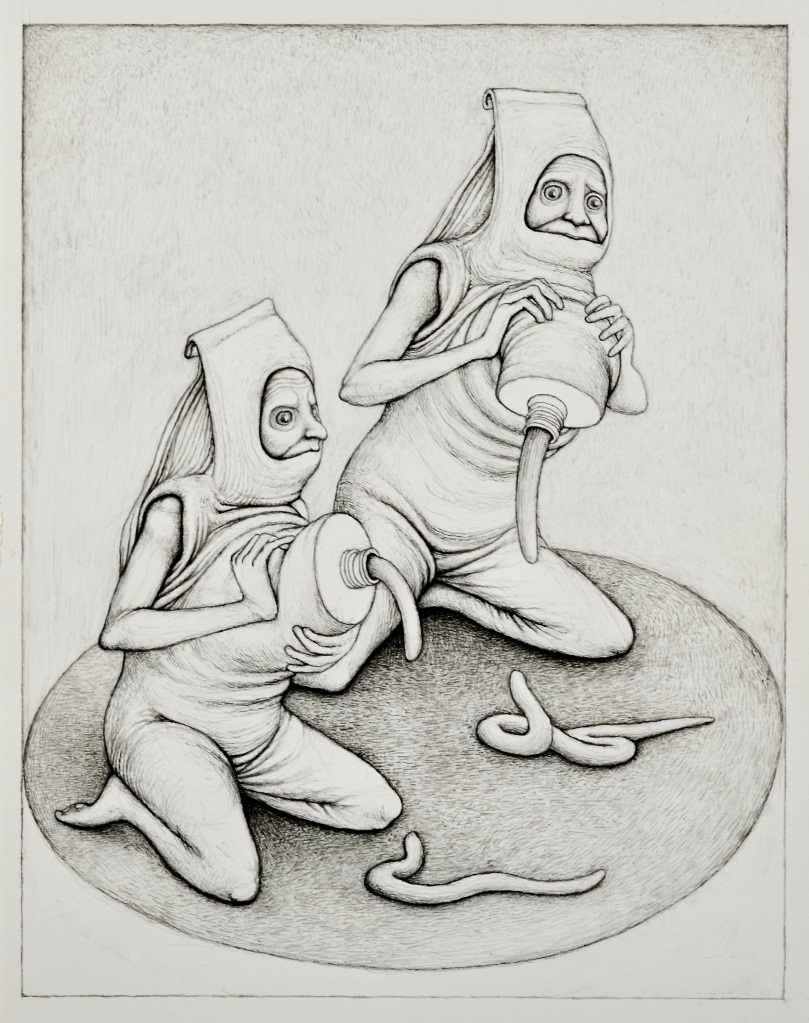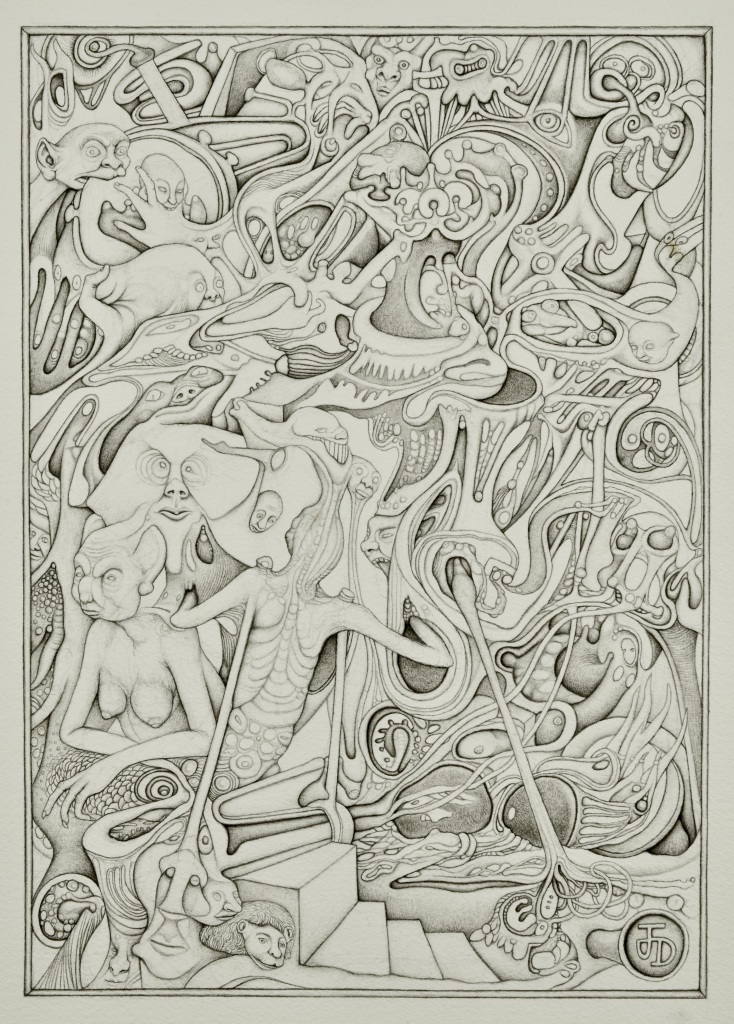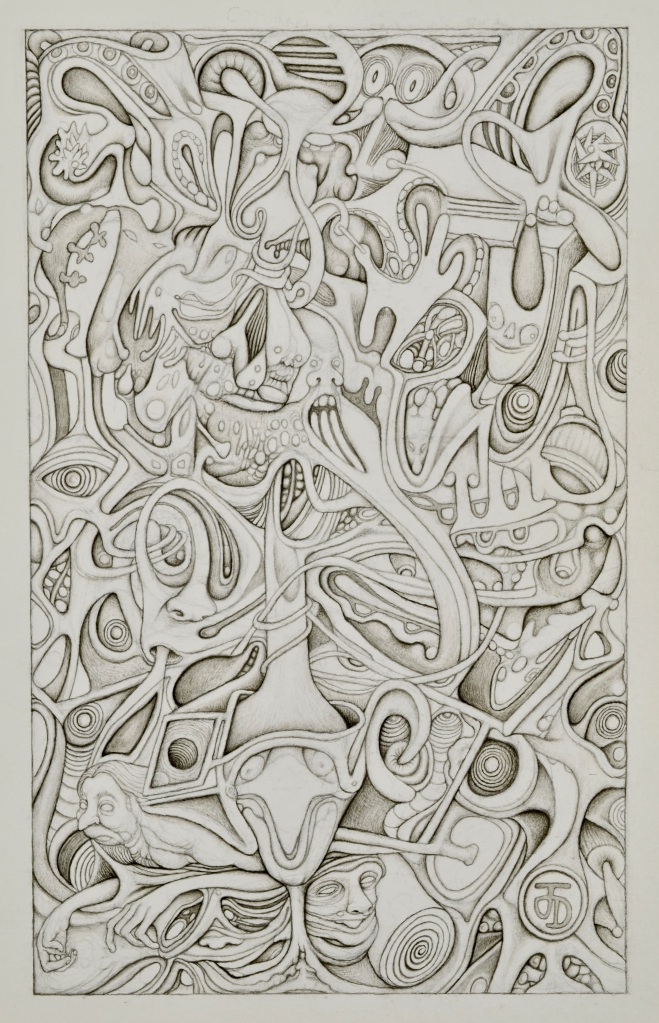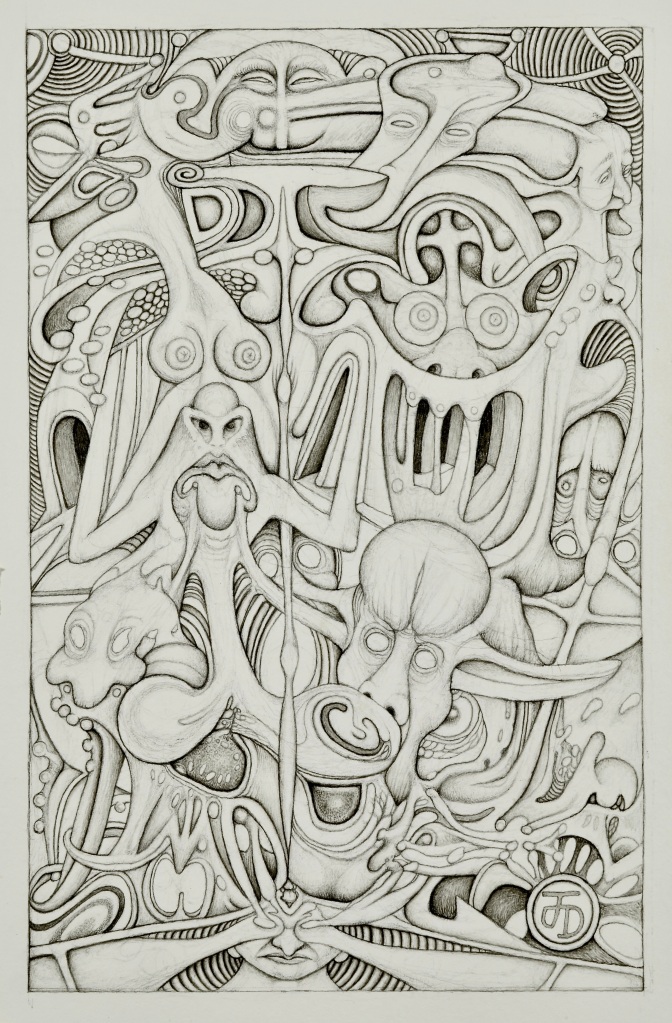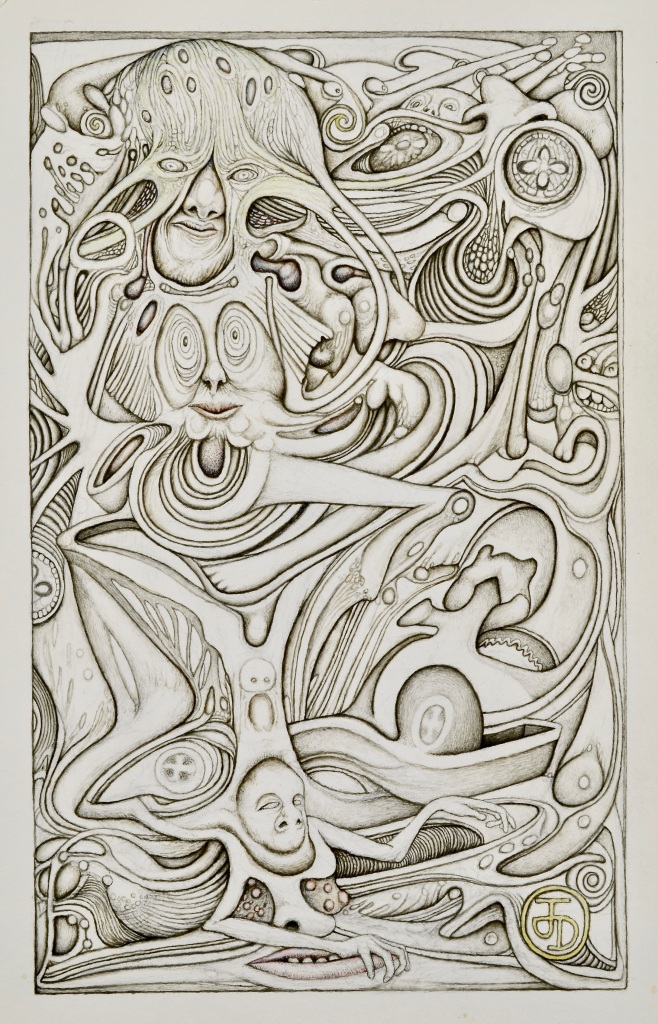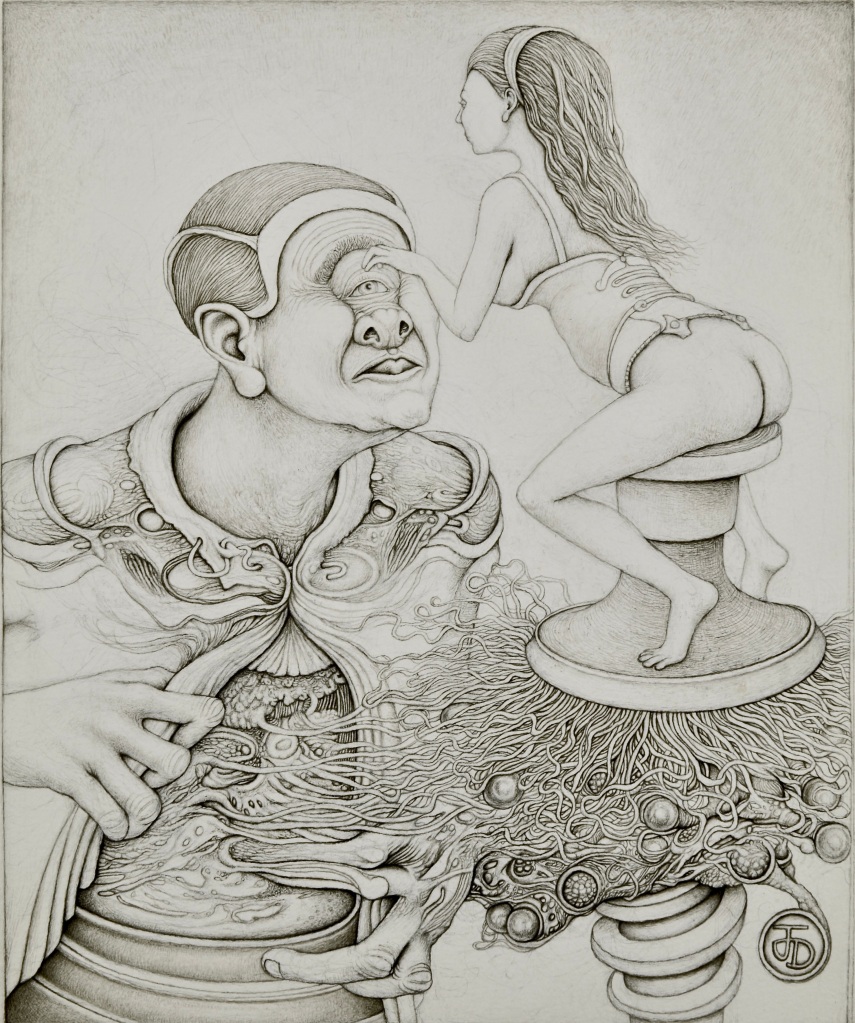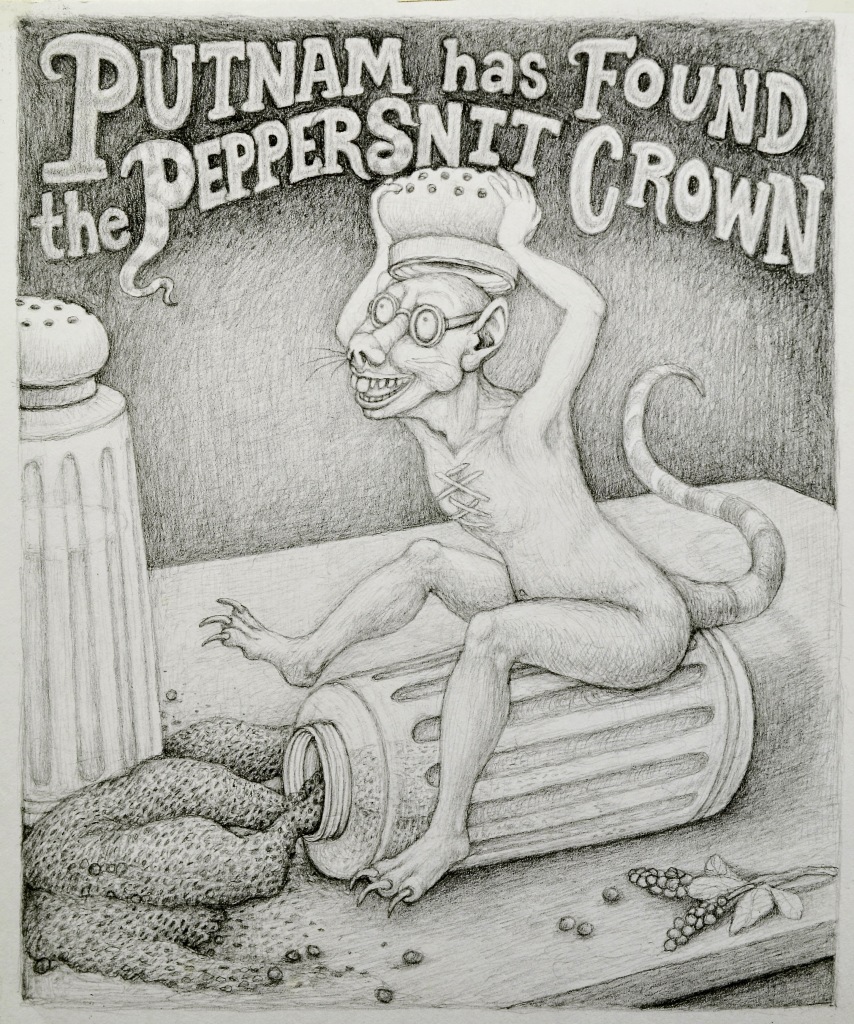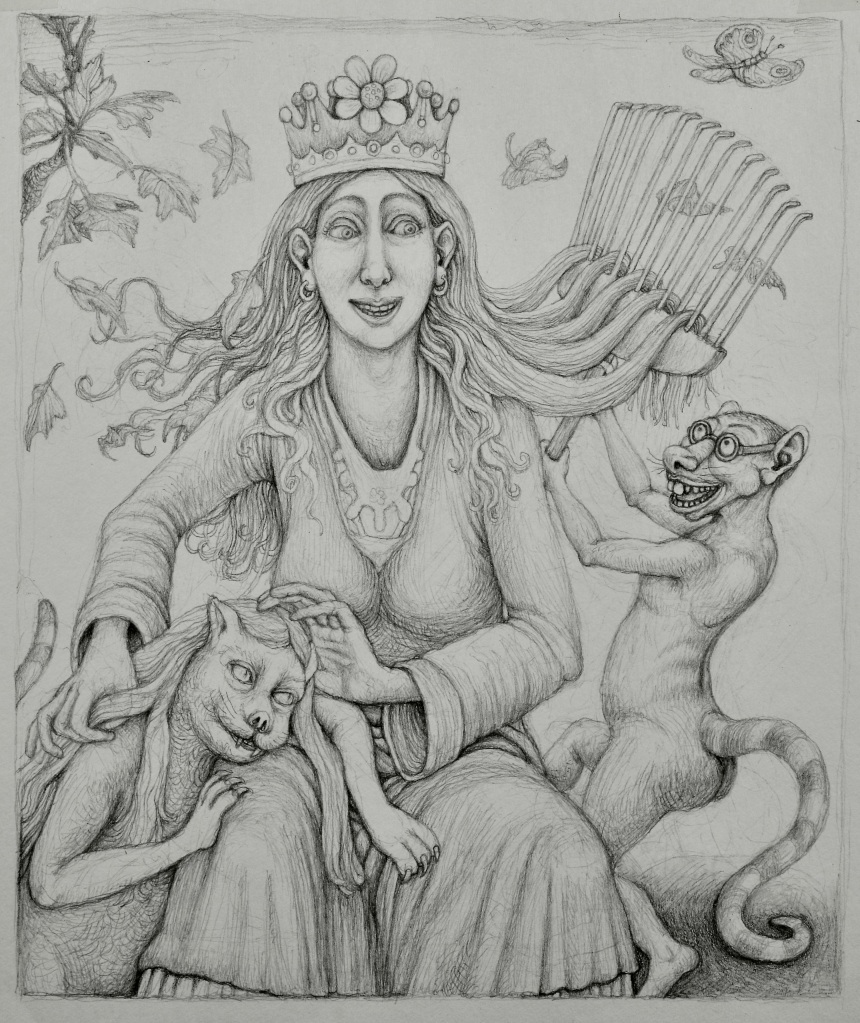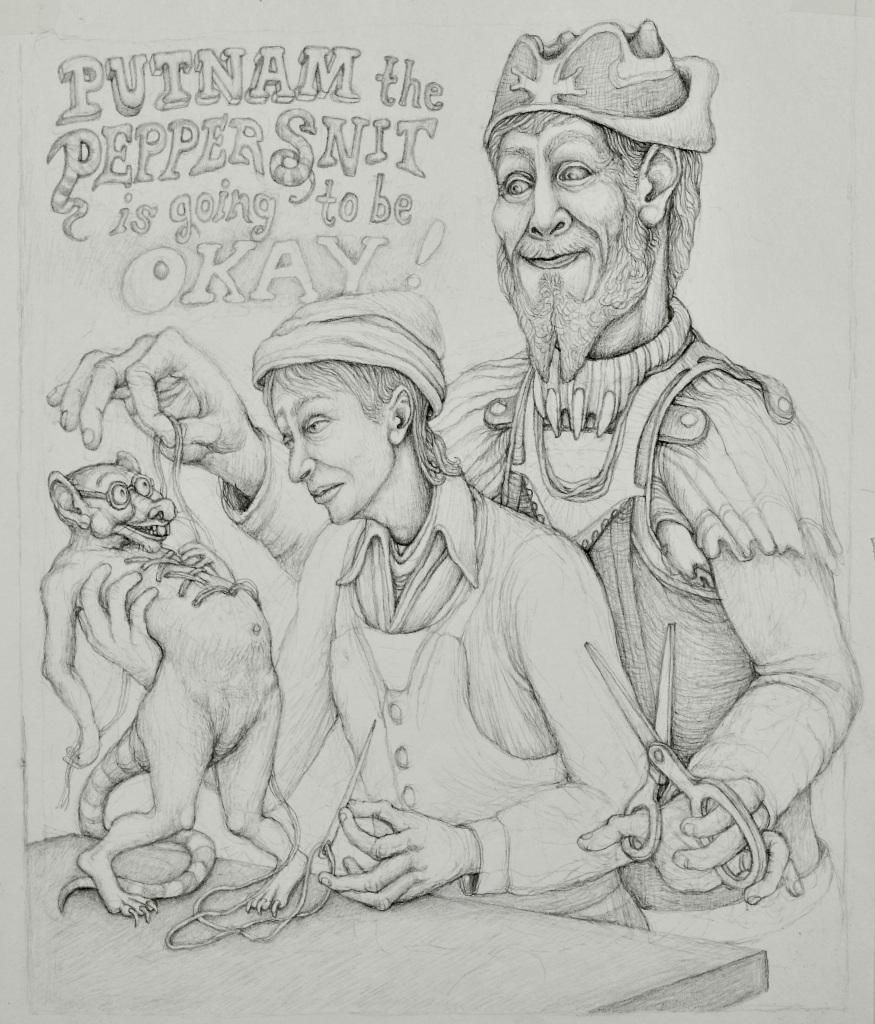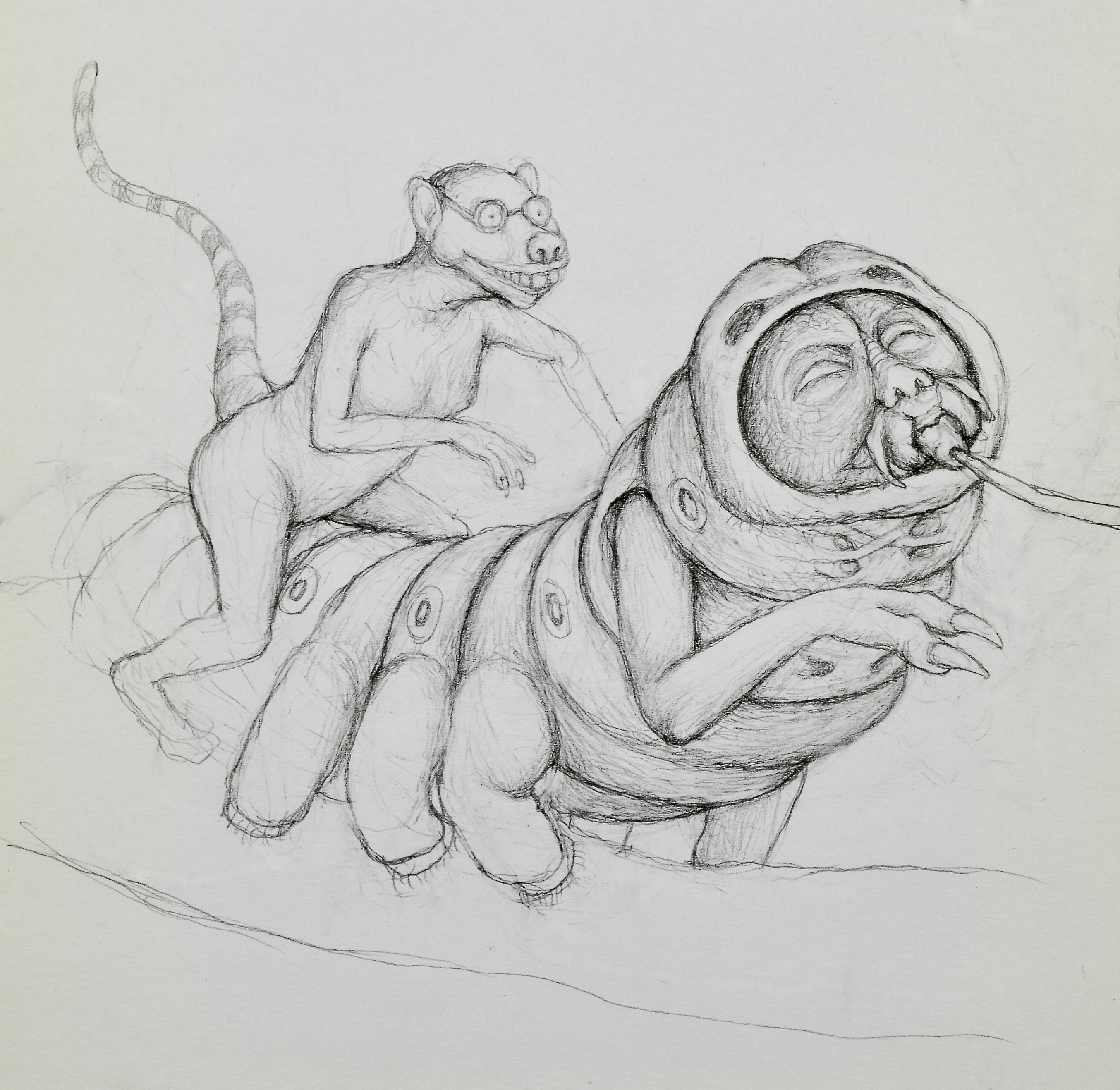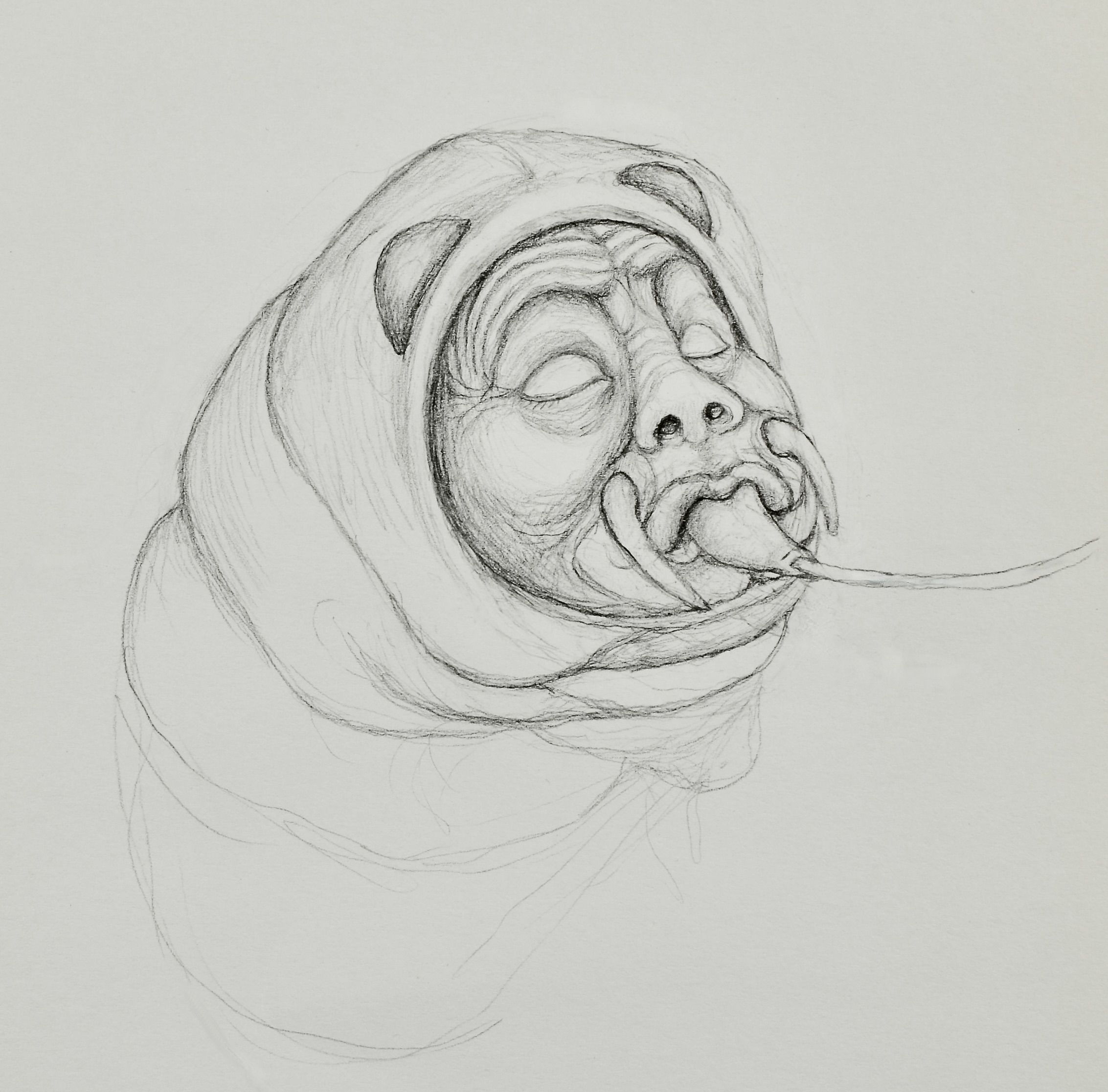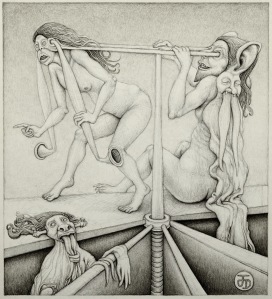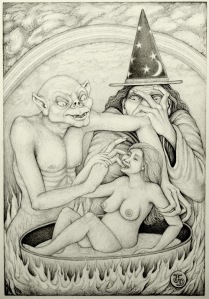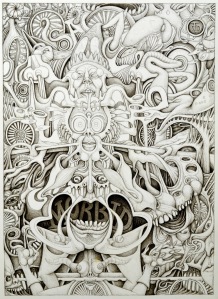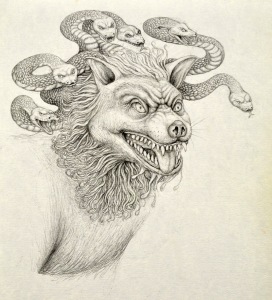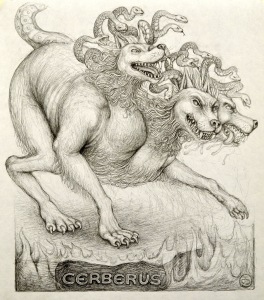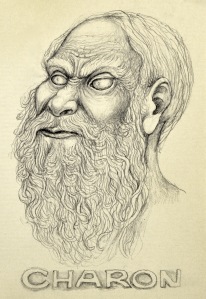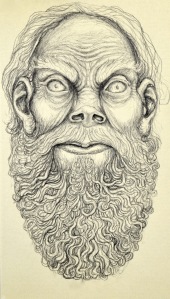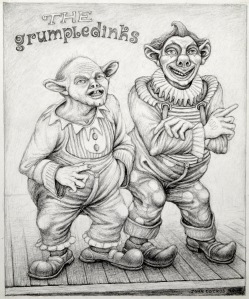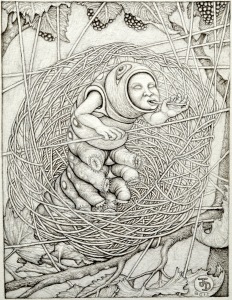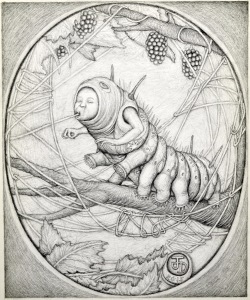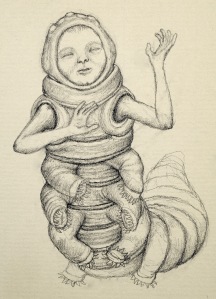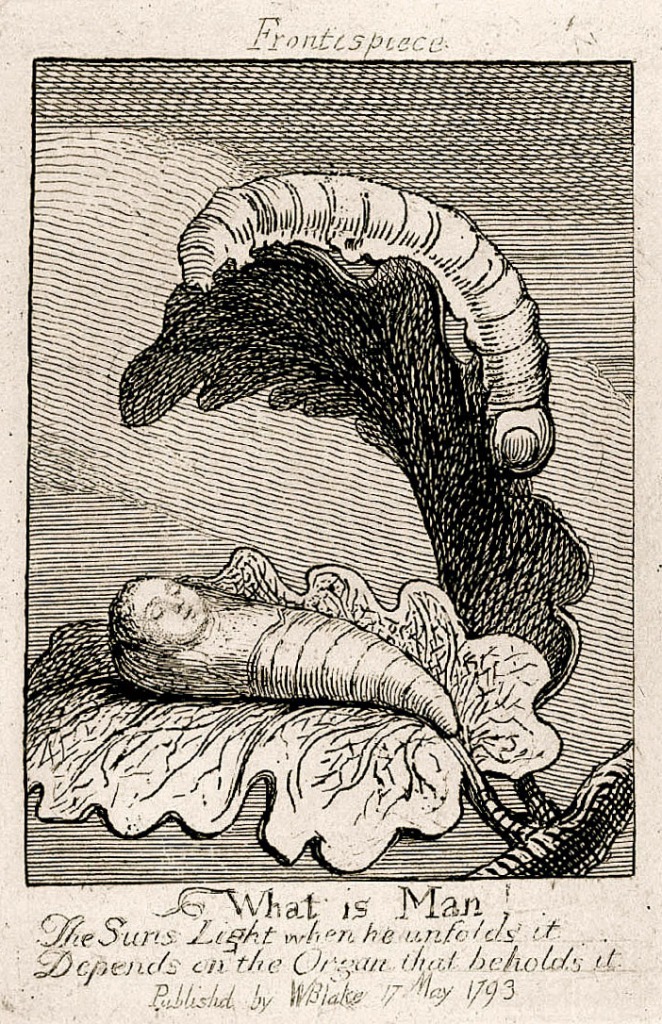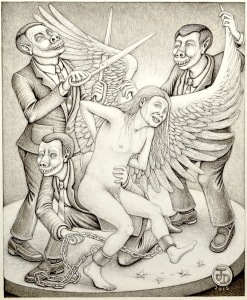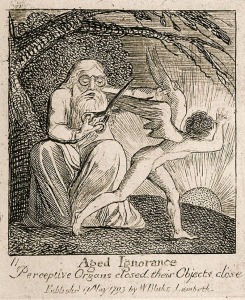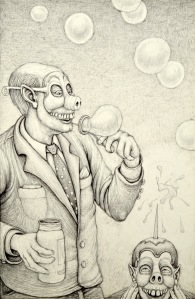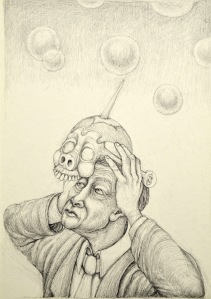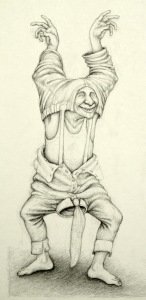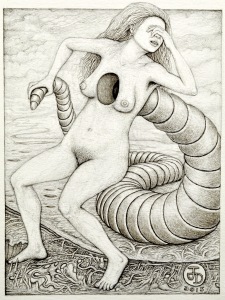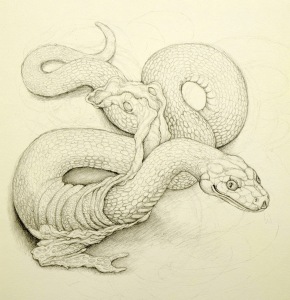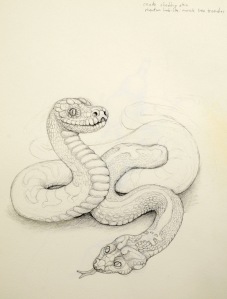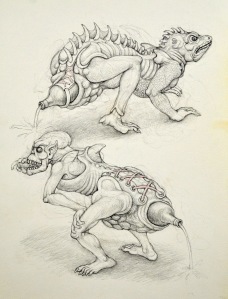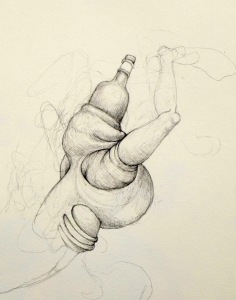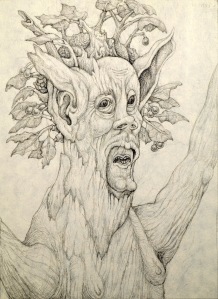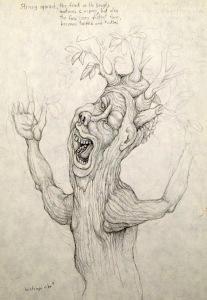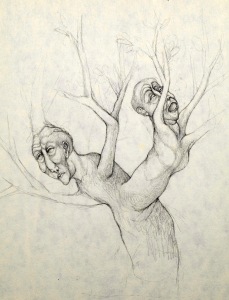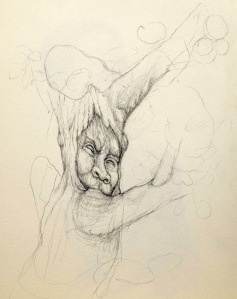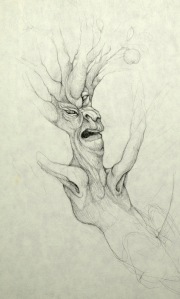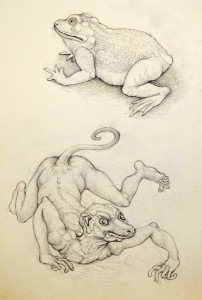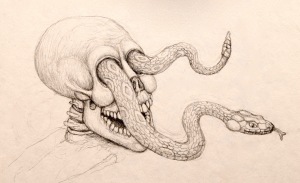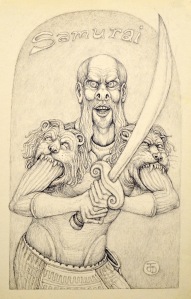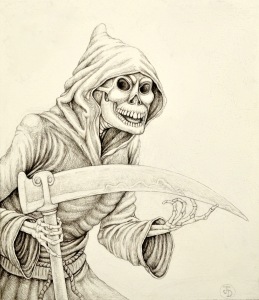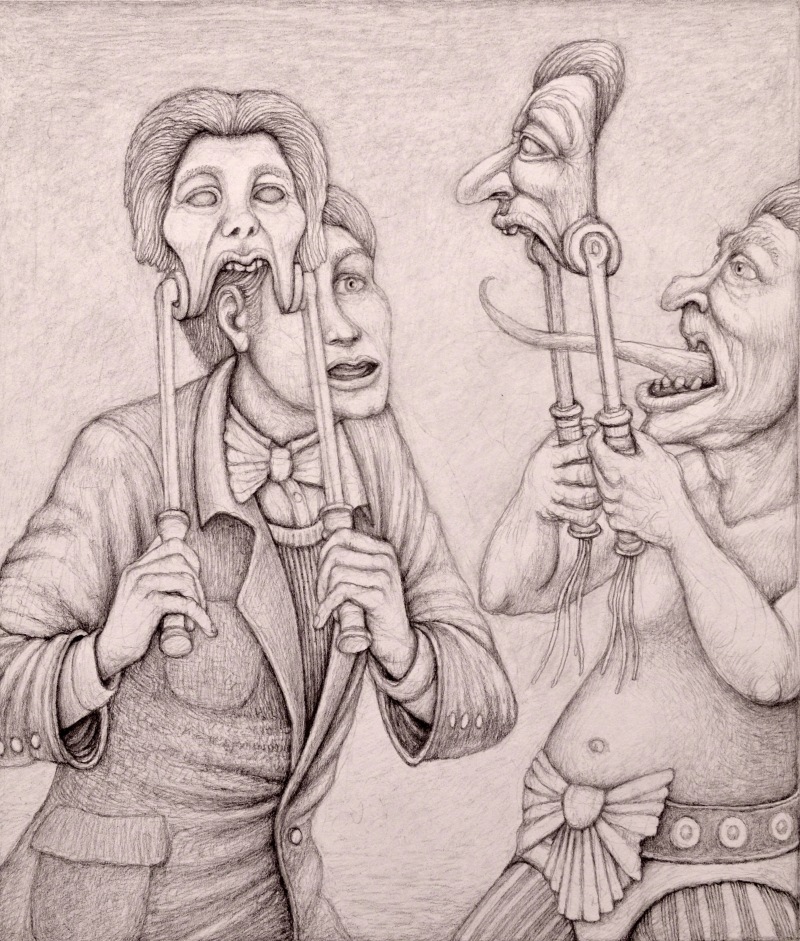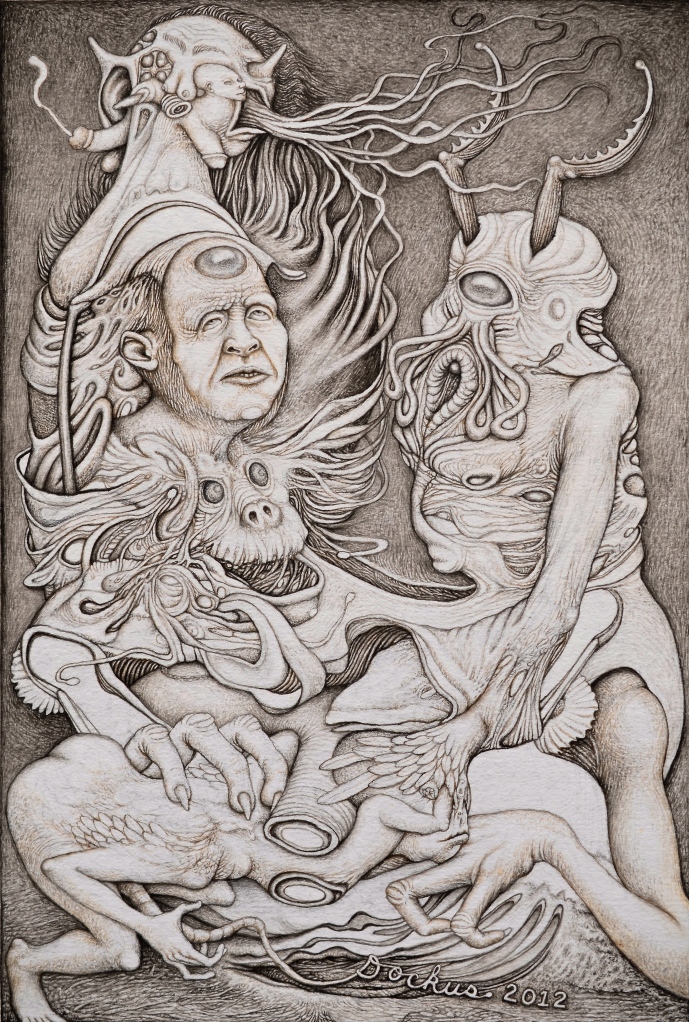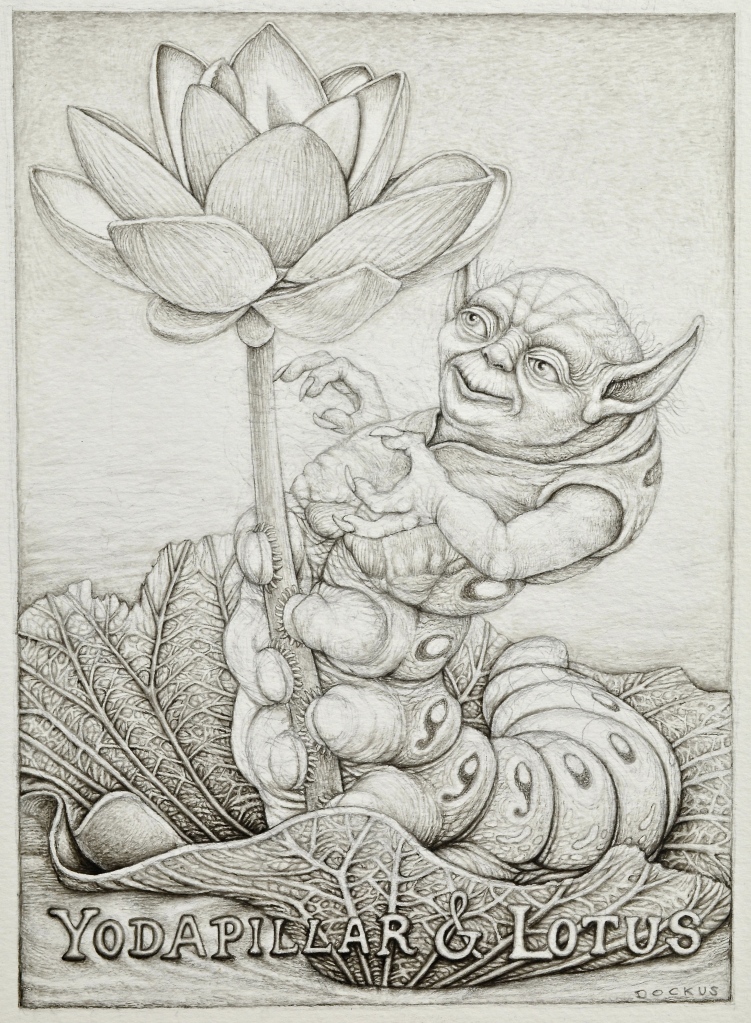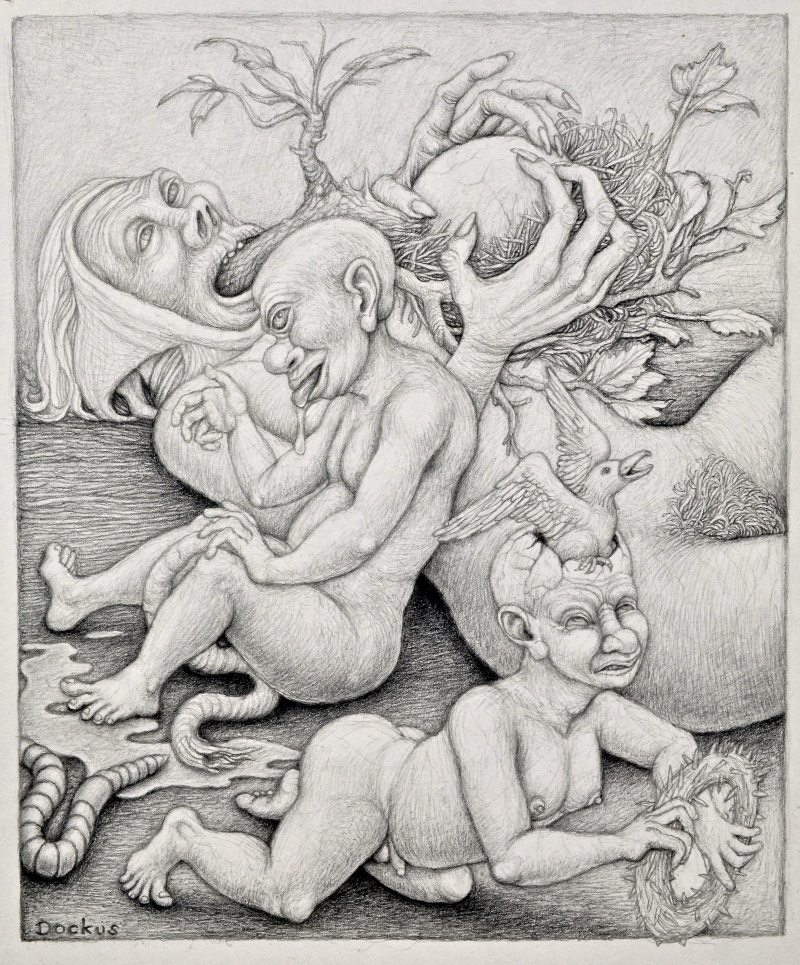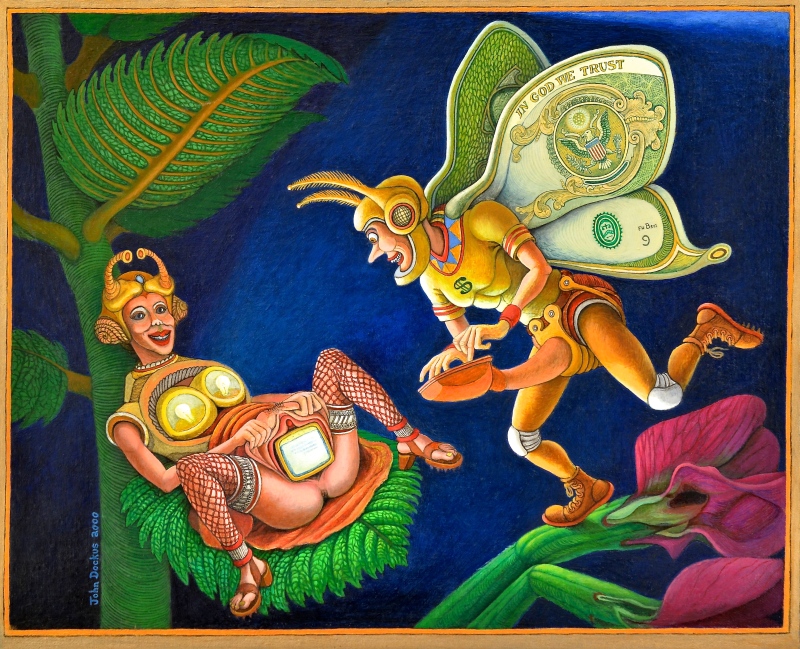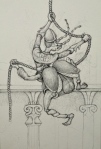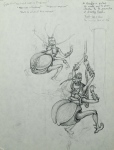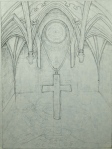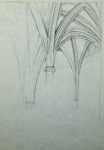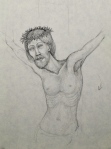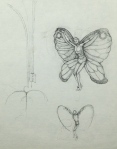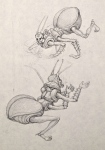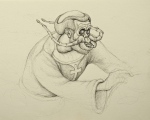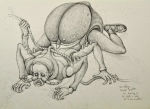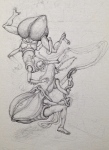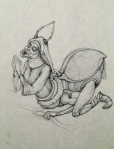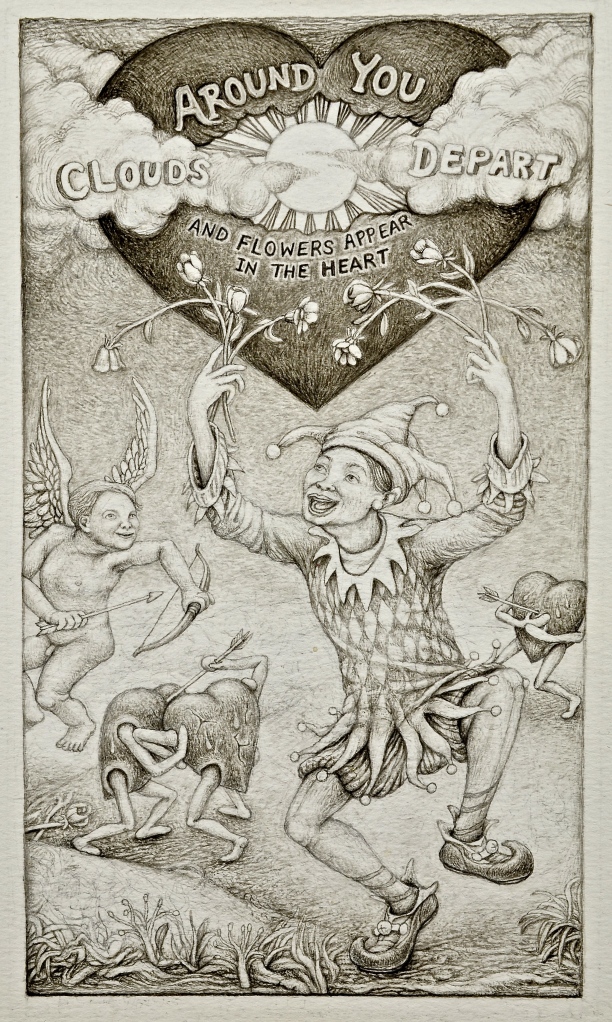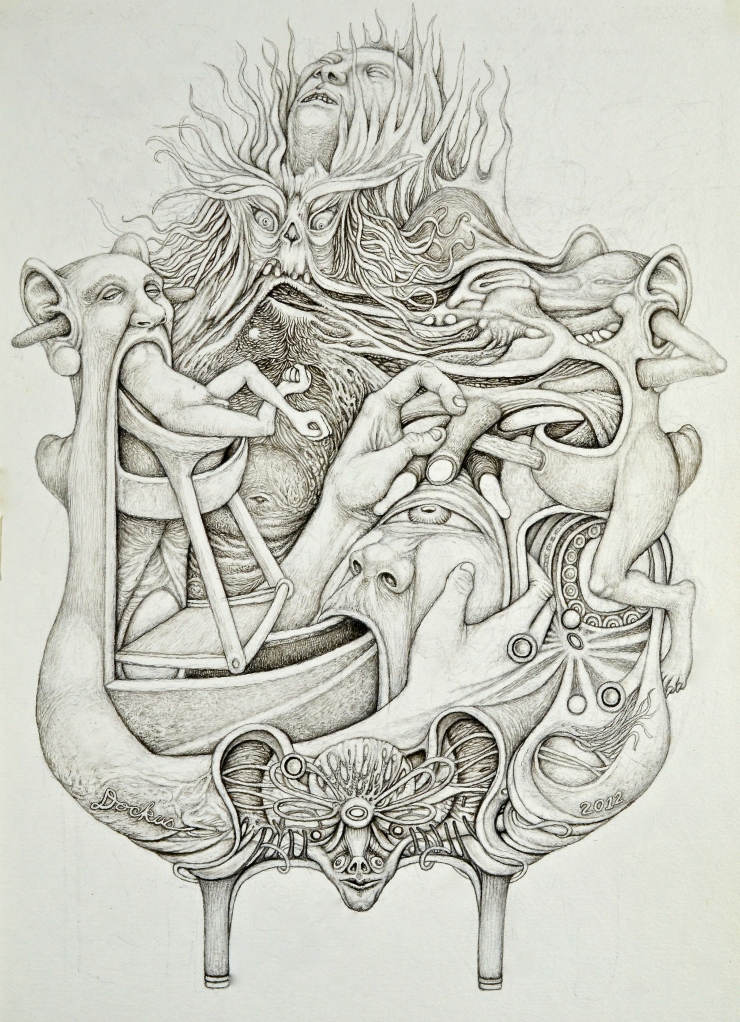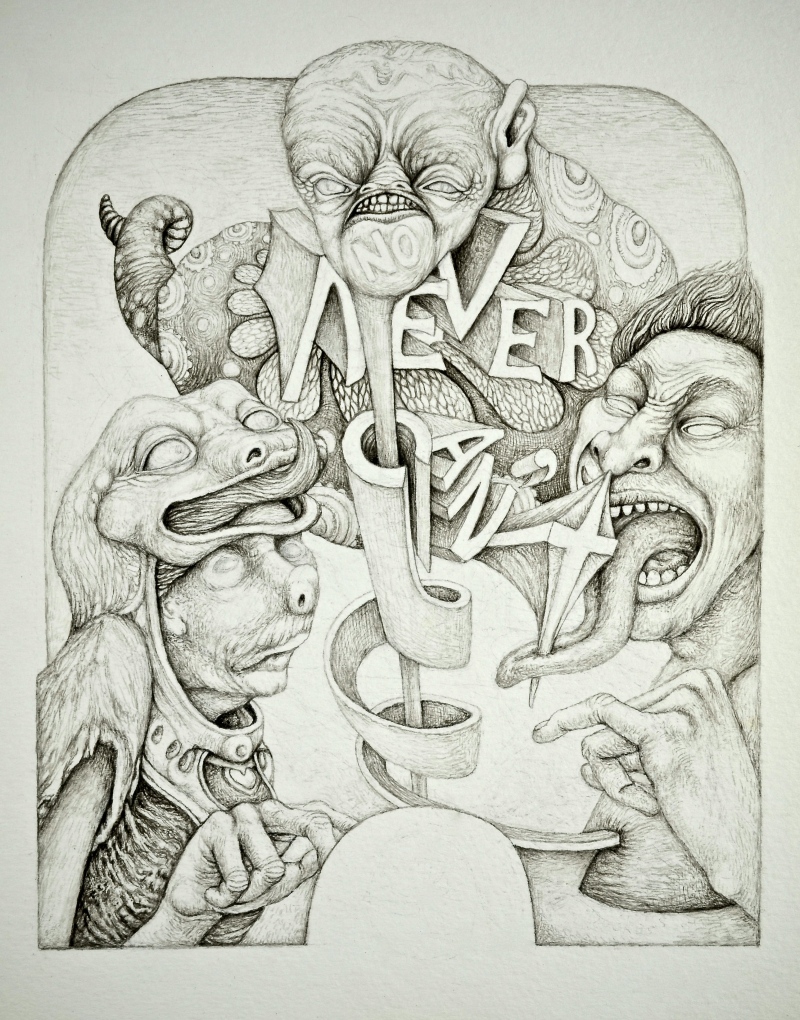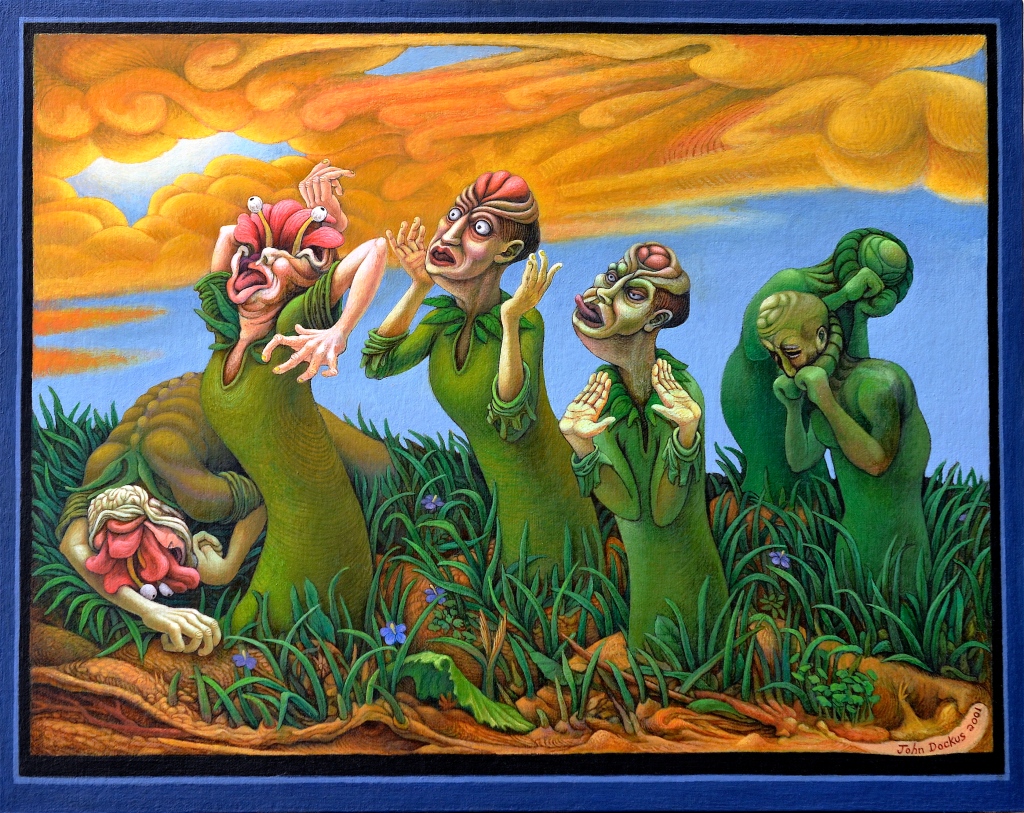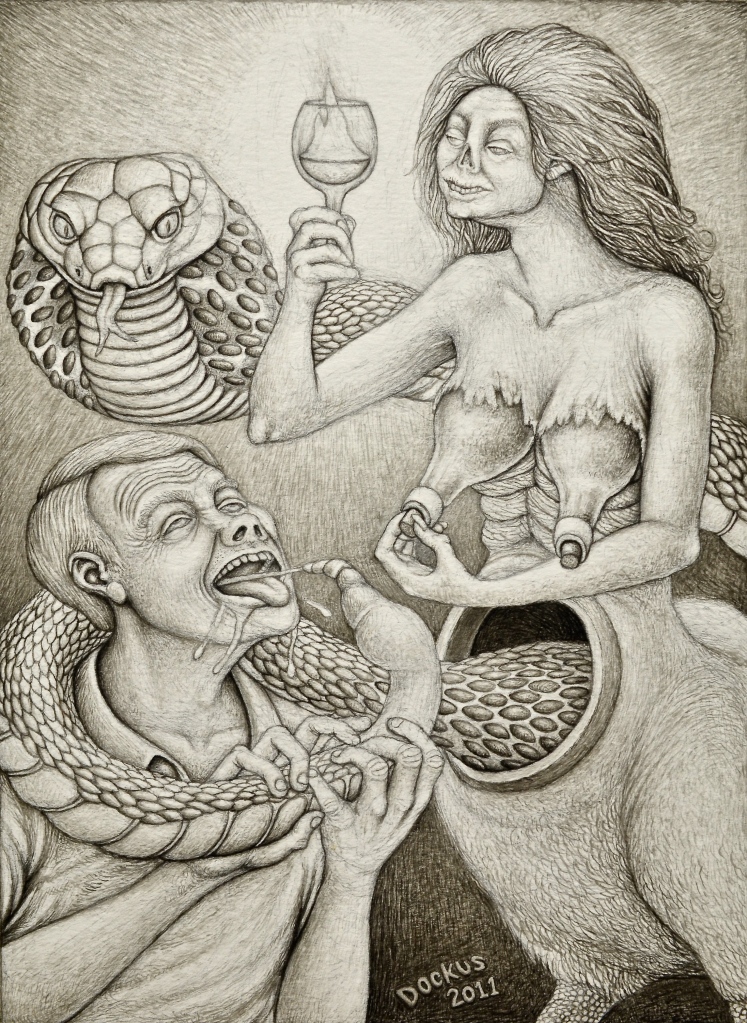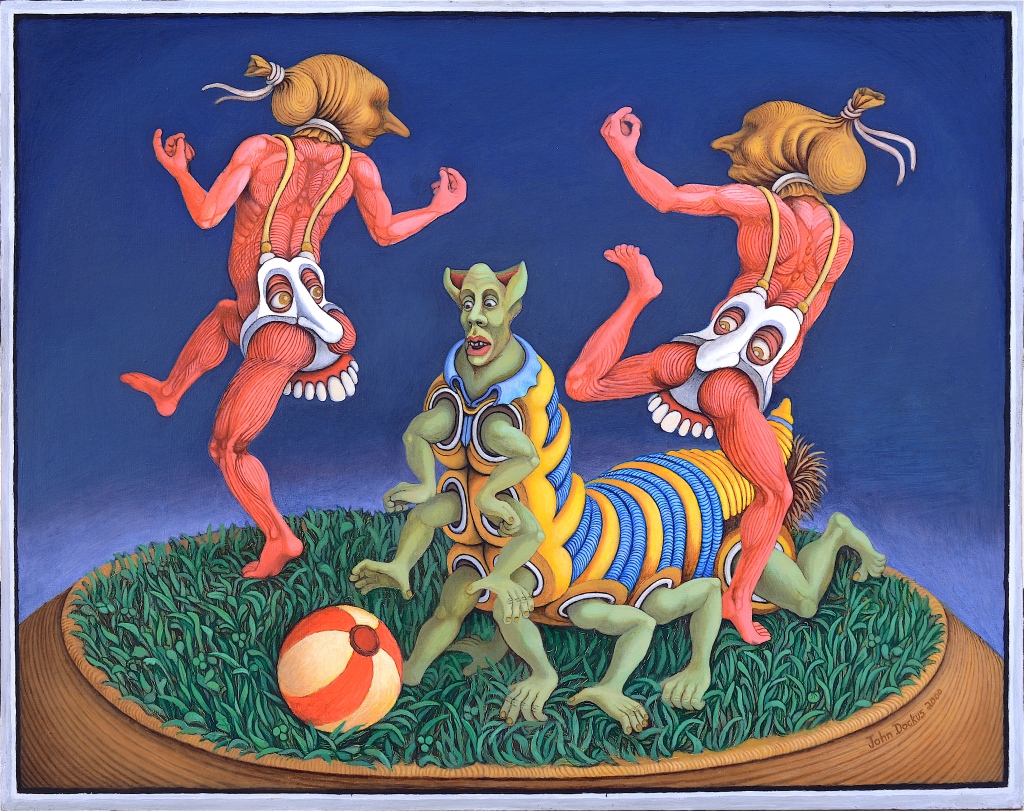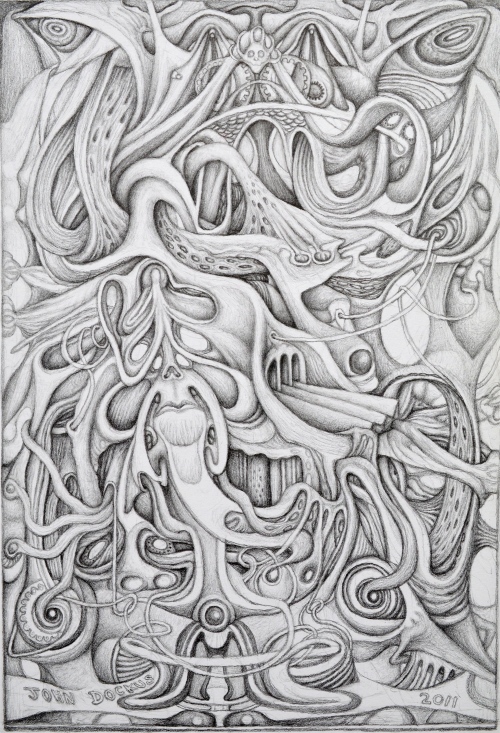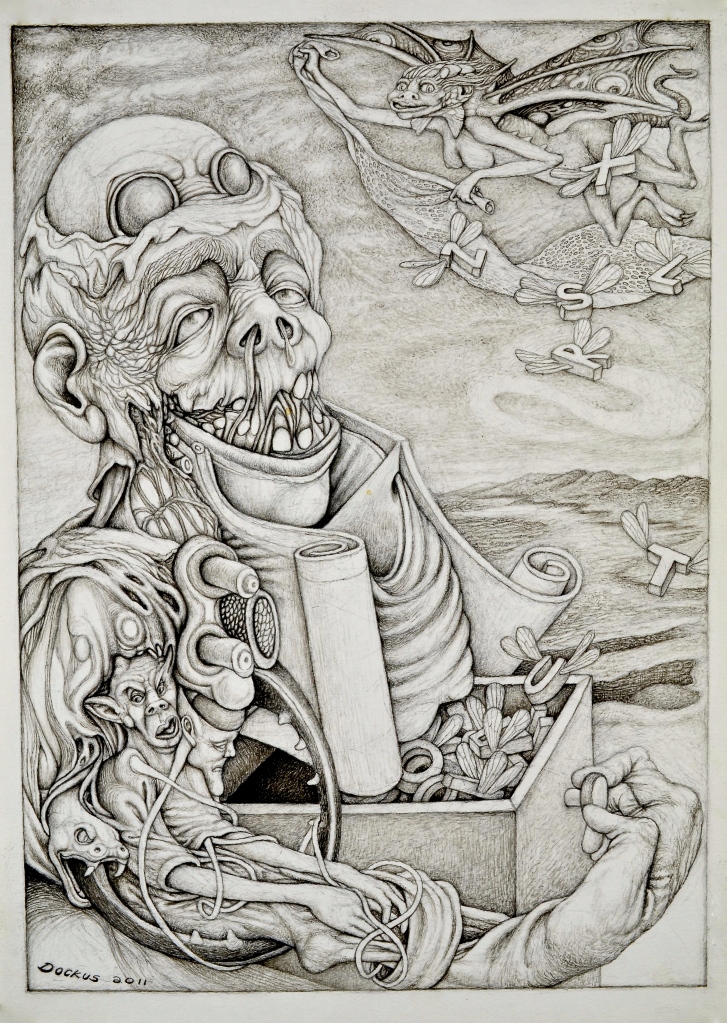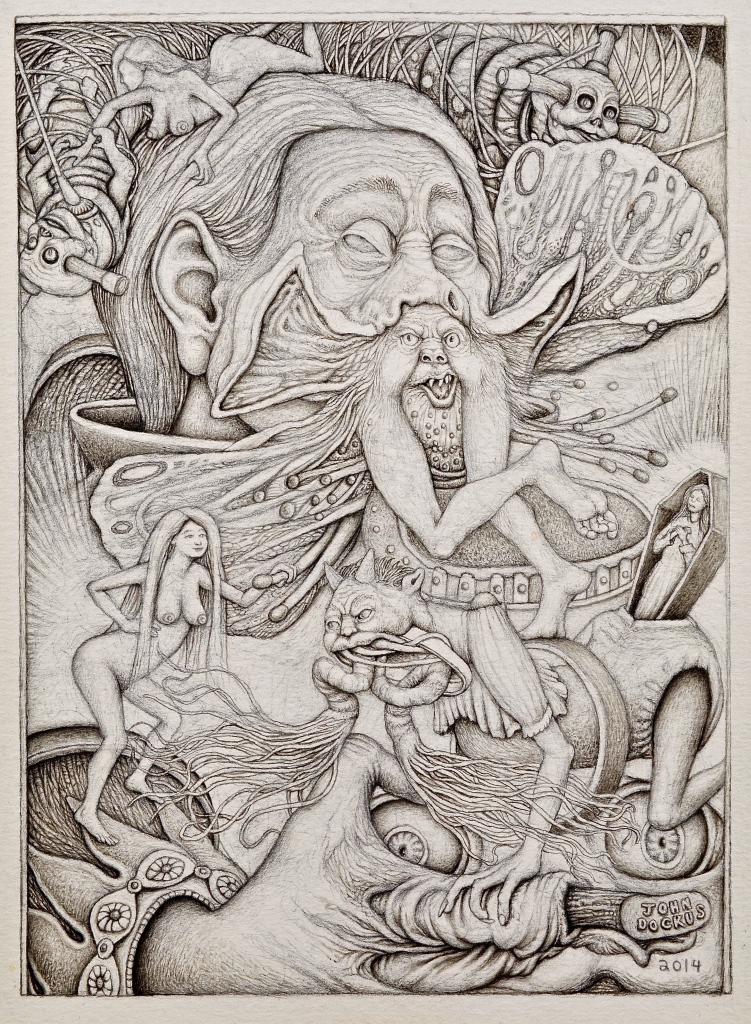
Stumbling along sad and dejected one late afternoon into early evening, the sky above purplish blue but down by the horizon turning the orangish red of rust, I veered onto a clover and ivy fringed path which snaked its way between old oak trees and moss-covered rock formations, and before I knew it I found myself in an enclosure surrounded by tall cypress trees.
On one side of the enclosure a rock face rose up, as variegated and full of character as any grizzled and wizened elder’s face, with dark, moody hollows around which spread lichens like age spots, deep cracks lining its craggy brow, and twisted and tangled vines hanging like hair down the sides. Flowing between dense thickets of bushes and wild grasses at the top, a narrow stream of water trickled down, collecting into a pool at the bottom. The ground beneath me was moist. It seemed everywhere I looked growth appeared which wasn’t there before.
A distant voice then spoke to me which also was so close and familiar. It seemed to whisper from within me and simultaneously to call out from the essence of things, no matter where I turned, making me feel some secret was about to be disclosed to me.
A diminutive man in size between a field mouse and a cane toad, gnomish but not a gnome, crawled out from under the broad-domed cap of a large mushroom, stood up and bowed to an audience of gently shaking daffodils and blue bells which only then I realized were behind me. He then looked up at me towering above him, his eyes wide and clear, a subtle grin on his face, and slowly turning and lifting his arms, he allowed me to study his appearance. He was a cross between a muppet and a Tiki doll come to life, having thin, arching eyebrows, human ears, full cheeks, a wide mouth, and a flat, upturned nose somewhat like a pig’s but with nostrils as delicately small as a salamander’s. His skin chameleon-like was the color and tone of my own, but it changed before my eyes, a golden light coming from within him, suffusing his entire being and making him glow pleasantly where his skin was thinnest, reminding me of the soft illumination of a chinese paper lantern. He wore on his head an acorn shell lined and shaped neatly in front with the hair-thin white parachute-seed filaments of dandelions mashed down and mixed with nectar, was barefoot and had on no shirt, a physique surprisingly developed and toned, and pulled halfway to his armpits was a kind of centurion skirt which also seemed like a diaper. I wanted to laugh and with a wave of my hand dismiss him, but I couldn’t because – I don’t know how – I felt he knew me intimately. Something in his bearing compelled me to regard him seriously.
He pulled himself atop the broad-domed cap of the large mushroom, pulling himself into the lotus position, and without moving his lips announced in a voice resembling my own: “I’m a homunculus. From alchemy within you successfully performed I was created. I sprang to life not out of any single part of you, but have arisen out of the essence of your wholeness, squeezed out of the apex of your totality. Out of the Heaven within you I dropped into this crude world. I’m the gold of your quintessence.”
Brushing himself off, removing the acorn shell from his head, shaking out his soft and frizzy chestnut-colored hair and then placing the acorn shell back on his head, he begged my pardon for how he was dressed. He told me he has better outfits. “In fact,” he said, “My entire appearance here is only an illusion suited to you presently. You should be grateful I’ve come to you in this form. If I arose before you in my full intensity and power you’d be blinded and knocked over, perhaps shattered into pieces. You couldn’t endure it. Your mortality is much too small and fragile a container. Believe me, it can get quite stuffy in there. For some time I’ve lived inside you, practicing incredible restraint not only to go unnoticed by you but to prevent hurting you. Often I’ve slipped out for some much needed fresh air and to stretch out my limbs.”
“Nonsense!” I exclaimed angrily, finding this hard to take from such a ludicrous looking little man. “I must be losing my mind. You’re only a figment of my imagination. I don’t believe in alchemy.”
“Ah,” he countered, springing to his feet and jumping down from the cap of the mushroom. “Remember what Marcel Duchamp of whom I know you’re quite fond once said: ‘If I have ever practiced alchemy, it was in the only way it can be done now, that is to say, without knowing it.’ Likewise, if you don’t believe in alchemy, that doesn’t mean you haven’t tapped into its sublime processes and operations. Presto! Here I stand: I can do no other. What more proof do you need? But I still don’t have a name, ” he said smirking. “Maybe you could help me. I was thinking how amusing it would be if you called me Junk Nugget.”
Unable to take anymore of this insolence and mockery, I lunged at him. I wanted to catch him and crush him between the palms of my hands. But when I swiped at him, Poof! He disappeared and I fell on my face. I pounded my fist on the ground and cursed so violently my face turned red. As I got back to my feet he reappeared behind me shaking his head, still grinning and calm, and pointed to an unusually grotesque mushroom which had just sprouted up where I pounded the ground. “A creation out of the energy of your rage,” he said. “And wouldn’t you know it? It’s poisonous too.” I stumbled back in shocked amazement at the sight, struggling to comprehend what was going on, when I tripped and fell into a pricker bush, which cut and scratched me all over. He told me the pricker bush sprang up behind me at the very moment I lost my temper and began cursing so violently. He told me it served me right I was the one who had tripped and fallen into it.
“Now are you beginning to understand?” he asked warmly. His demeanor toward me had suddenly turned gracious and sympathetic. “Look around you. From within you I’ve been directing your energies, materializing them, narrowing and pulling them like colored threads through dark openings, drawing them up into the sky and back down again, reconverting them to energy and light; but without you I wouldn’t exist, and needless to say neither would this enclosure and all that’s in it. Your guts and bowels have combined through me and come out as the soil beneath us. Your heart pumps and circulates sap in these plants and trees. Here in this enclosure when you have a beautiful thought, a flower blossoms. Your bones and whatever else hard and callous, melded in accumulation with even older things in you petrified and ancient, is the rock face, rising up and casting this shadow. And lastly your subconsciousness is the stream of water trickling over the rock face, fluid, always in motion, which collected into the pool at the bottom, deep and clear and with a surface like a mirror, carries in its reflection the truth of your reality.”
I stood knotted up with tension and unable to move, staring at the shimmering surface of the pool of water. I couldn’t help but wonder, “Is this some hallucinated variant of the mythical story of Echo and Narcissus I’ve been trapped into enacting?”
I asked him why he appeared to me now and not at some other time, and he replied: “I’ve stood by long enough watching you knock up against the bounds of language, straining for purity and perfection even as the worm turns in you. Once upon a time your stem dried up, snapped, and you fell from the Tree of Life, rolling and bouncing out of the Garden of Paradise, bruising badly along the way and splitting your face open against a rock. You’ve healed on the outside, but inwardly, deeper down, you remain damaged and suffer memory loss. Ever since you’ve been striving to return to that Original State, punishing yourself for your inability to do so and trying to forget by doing things too embarrassing to admit, from pathetic to desperate, silly to perverse. Rejecting organized religion and anything involving a monotheistic God who tyrannizes over humanity, you’ve been driven into the shadows and there have tried to achieve unity and transcendence through the occult and mystical, but in your honesty have never been able to believe in those abstruse and esoteric signs and symbols either which promise so much but yield so little; so now you pursue what you feel may make you whole again in what’s even more rare and strange, digging into yourself, heading further into obscurity, really only becoming more profoundly and immaculately empty. It’s sad to see how fixed in thought you’ve become, so narrowly self-determined, lacking that spark and thrill of spontaneity and risk which really breathes life into matter and animates it. You’ve become like an hourglass, each word you express like a grain of sand falling through your center. You sidle like a crab toward oblivion. I’ve been moved by your isolated attempts through art to create beyond yourself something durable and lasting, even despite the fact you’ll never escape your own mortality and the law of compensation.”
He didn’t really answer my question, but what he did say so struck me by its verity I was shaken to my core. Still I didn’t trust him enough to reveal what I was feeling. I tried to maintain my composure, but when I squeezed my eyelids shut to keep my tears from falling, the stream of water outside me swelled and surged over the rock face, cascading down, mist filling the air and wetting my face. I held onto my emotions for dear life as they rose up and swirled around inside me, gathering force as against a dam, until I couldn’t hold them in any longer; and when finally my eyelids were forced open and tears gushed out, streaming down my face, the water which had been roaring outside me gradually calmed and narrowed back down into a trickling stream. It was magic to me. Never before had I felt such a strong and direct connection with nature. I had achieved a state of equilibrium, a balance between inner and outer, a living and breathing harmony. I was so relieved and filled with joy I began to glow as the golden light from within him dimmed and flickered, traces of silver appearing at the corners of his eyes and around his mouth.
Surprisingly he was delighted by this transference of energy to me and the change it precipitated. “As you can see,” he said, “the law of compensation isn’t just a theory or an abstract notion. It operates in other areas of your life too, rippling throughout and returning to you in unforeseen ways, but don’t let it go to your head. You can no more control it with your conscious mind than the sail and rudder of a boat can control the larger overall direction of the wind and the heaving of the sea.”
As he spoke he continued to flicker, more silver breaking out like a rash around his ears and on his forehead. When he looked down and saw copper flecks appear like freckles on his belly, and he lifted his arms and saw them there too, he broke into a hearty chuckle. “Silence is golden,” he told me. “If Silence is like the sea, then in its depths are where the treasure is hidden. The breakers on the surface are but chatter. In the beginning wasn’t the Word or even the primal scream. Before the creation of the world was Silence, and after the world dies out or is destroyed, should that happen sooner or later, there will be Silence again.” As he pondered aloud, searching for the right combination of words to unlock the meaning he had in mind, I could tell he wasn’t satisfied. He turned away lost in thought, continuing to search, a couple times muttering, “No, that’s not it”, before giving up and letting out a sigh. “Out of the Word or the so-called Logos,” he finally said, “which in this crude world can no more be sustained in sublime elevation than a person literally leap from cloud to cloud, could only come words of increasingly diminishing value, like a river flowing from the sea, branches off inland and narrows into streams, most of which either dry up or form into stagnant, muddy pools. Words definitely lose their stature and power, their deep and abiding mystery and rich and illuminating aura, the further they stray from their origin. Speech is of Time, and Silence is of Eternity. If I opened my mouth and just let words pour out as any mortal might do, wagging my tongue, it wouldn’t be long before I turned as cold and hard as iron.”
He then closed his eyes, seeming to project his mind beyond time and space, and meditated, Silence filling him up from head to toe, the traces of silver and copper flecks on his skin becoming absorbed, until his body returned all over to a golden glow. I was amazed by his ability to regenerate, and I felt he didn’t do it at my expense. As the surge of energy which so brought me to a peak of exhilaration reversed its direction, slowly drained from my body and was absorbed back into his own, I no longer felt in danger of losing myself but that I was a participant in an ebb and flow of energy whose waves began far outside my field of vision, perhaps generated out of the harmony of the spheres, and concentrated in Silence were somehow narrowed down by him and woven out into this living tapestry around me which also acted as a cocoon.
At the moment I had this realization he opened his eyes wide, his face now positively radiant. He then snapped his fingers and a big soap bubble which would delight any child floated over the rock face and drifted down into the enclosure. It nearly touched the shimmering surface of the pool of water before catching a breeze and floating back up in the air, swirling around, softly illuminated by the rays of the setting sun now caught and reflected back by the rising moon, filling me with such peace and wonder I felt I was dreaming; and when seemingly guided by his own will the soap bubble floated back down and gently touched the palms of his outstretched hands, it instantly turned into a crystal ball the size of a marble.
He breathed on the little crystal ball, rubbed it with his little hands, then held it up. It gleamed and shone with a power and meaning only he seemed to comprehend, and to understand it I knew I’d need him to translate it into human terms. As he made clear to me, however, the time for words had passed. Smiling and staring wide-eyed in a kind of trance, he lowered the little crystal ball to the ground, sitting down, pulling his legs in and nestling it between the arches of his feet; then mysteriously pointing skyward with one index finger and touching the top of the little crystal ball with the other, he bowed his head deeply, his face no longer visible to me, and for some time he remained fixed in that position. I couldn’t take my eyes off him as the energy slowly drained from his body and was absorbed by the little crystal ball, while in turn I felt a new kind of energy enter my body. I gasped and nearly fainted when he finally looked up and I saw his face had turned into my own. He quickly looked away when I tried to make eye contact with him. Panicking I reached up and touched my face, dreading it had turned into his own. ”What’s going on here!” I cried. As I frantically felt around my face for recognizable features I noticed my hands had shrunken too. I then looked down and saw to my horror that my whole body was transforming and I was turning into him. I fell to my knees and crawled toward the pool of water, desperate now to see my own reflection, but before I could reach the edge, he stood up behind me, towering over me as I had towered over him before, and picking the little crystal ball out of the palm of his hand, pinching it between his thumb and index finger, he threw it over my head and it splashed into the pool of water.
As the little crystal ball slowly sank, the stream of water trickling over the rock face stopped, and I felt a strong tug on my insides as if from behind me he had yanked on an invisible cord. I was literally lifted off my hands and knees into the air, my limbs flailing every which way like a rag doll as I flew backwards several feet and dropped onto my backside, which really hurt but maybe was for my own good; for just as I landed the little crystal ball hit the very bottom of the pool of water, and – remarkably without an explosion – a tremendous flash of light lit up the entire enclosure. I was blinded, but the flash without in any way being destructive was so powerful and penetrating that it warmed and opened my heart and turned my otherwise murky and confused mind as clear as crystal. O sublime seed of alchemy which upon being planted at the right time and place instantly springs up and blossoms! I felt incredibly alive, as magnificent as a god, all my senses heightened; I no longer cared what form I had taken. When my eyesight returned, gradually fading back in, I was so happy I rolled over and jumped to my feet, did a cartwheel and the acorn shell fell off my head. When I looked down and saw it I laughed and clapped my hands, and picked it up and placed it back on my head. I then turned around and stepped back toward the pool of water, entranced by the golden glow which now emanated from it. Calm and still, its surface had become as shiny as glass, as rich as a jewel, a magic mirror, the warm golden glow carried within it softly illuminating the rock face and all the plants, trees and flowers around me, and even the unusually grotesque mushroom and pricker bush I had created. I was now proud of these personal reminders and the lesson they held, finding understanding and acceptance and patience and many other valuable faculties and attributes in the blossoming of my new-found creative mind. Looking down and seeing I had the same warm golden glow as emanated from the pool of water, I felt then, if I wanted to, I could with a wave of my hand shrink the moon into a cue ball for use in a game of pool, or snatch a rainbow out of the sky, reduce it in size, and make a jump-rope out of it. I could push a dream over the edge into nightmare, then turn the nightmare inside out and, elevating it, set it back free into dream. I could even change my own shape.
Rejoicing I snapped my fingers, and as if time stood still, reversed its direction and, hiccuping, overlapped itself, returning to the present, concentric ripples reappeared moving in reverse on the surface of the pool of water, and one soap bubble after another emerged where before the little crystal ball had splashed in, rising out of the vortex and pulling free, all of them floating around wondrously, marvelously swirling around, some expanding too much and bursting, some bumping into each other and merging like lovers, several of the more oddly shaped ones wandering off solitary, each in its own direction. One particularly inviting soap bubble, perfectly spherical and just the right size, drifted down so close to me that on a whim I leapt on top of it, realizing I could make myself as light as a human breath, and immediately appearing in the golden glow softly illuminating the enclosure, in accommodation of my desire, was a breeze in the form of a lovely woman, ethereal, the flowing of her long translucent gown generated from within, and moving beneath me, just as she began to fade back into invisibility, she gave the soap bubble I was straddling a gentle push. I floated up over the pool of water, giddy and delighted, tipping the acorn shell on my head to each soap bubble I passed as I ascended, until finally rising above the tops of the tall cypress trees surrounding the enclosure I saw out to the horizon – the moonlight glistening on the sea, the stars twinkling high above – and I felt the majesty and grandeur of nature.
Shining brighter than ever, rays of light escaping my body, close to bursting into a microcosmic sun, the soap bubble on which I was floating, like the one before it but this time unexpectedly to me, turned into a little crystal ball. I fell with it out of the sky, grabbing hold of it, the acorn shell flying off my head and catching on fire, which just as quickly went out in a curl of smoke. I pulled the little crystal ball into my chest, hugging it on my way down as it pulsated with all the colors of the spectrum; then intensifying into the purest white light, I merged with it in a fantastic blur and splashed into the pool of water. The concentric waves which rippled out from my point of entry, instead of hitting the surrounding edge of the pool of water and rebounding back, lifted off shimmering into the air, one after another, and formed into rings which undulated all around me. More and more lifted off and joined the others, whirling around, and formed into a funnel, into whose spinning walls all the light in the enclosure was absorbed, separating out into luminous white around the top where it opened to the night sky, all the colors of the spectrum in between, and glowing gold where it narrowed down below, swirling and glimmering around a black hole which pulled me in.
As I fell headlong into the black hole, an accretion of gold gleaming along its inner edge, as if lying in wait for me, twisted into a cord which looped around my ankle, tightening as I plummeted into dark space. As the golden cord uncoiled, spiraling behind me – the mouth of the black hole gradually widening – hidden stitches splitting – the funnel lost hold of its center, wobbling as it loosened, finally lifting off and dissipating, the entire enclosure above following, coming apart at the seams, all the frayed edges catching on fire, everything going up in smoke.
Energy surged down the golden cord, passing through my body and back out into space, vibrantly glowing concentric waves gathering and merging below me, and turned into a gold ring, which after I fell through it dissolved, fading into darkness. Lessening in intensity the energy continued to flow through my body and back out into space, concentric waves again gathering and merging below me, still lit up from within but now flickering, and turned into a silver ring, which after I fell through it also dissolved, fading into darkness. The same happened with copper and bronze, each ring manifesting below me significantly larger than the one above it, each one after I fell through it dissolving, fading into darkness, feeling myself all along the way growing larger and heavier, until finally, returned to human form with the cord spiraling behind me turning to a stream of water, I fell through the last and largest ring of all, that of cold, hard iron, having come full circle dropping out of Heaven and back into this crude world.

